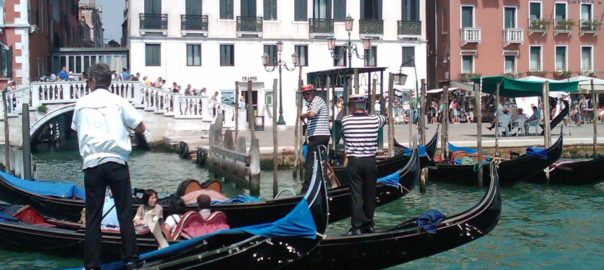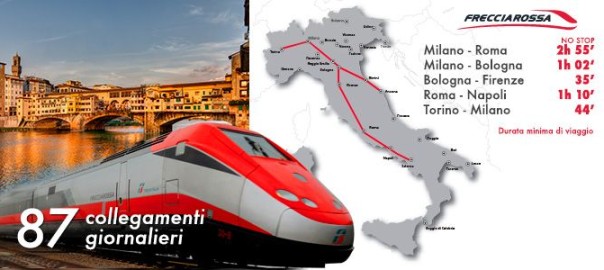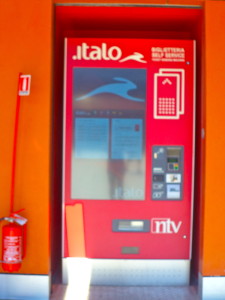Italian Travelers: Sightseeing Today!
Follow Caterina and read about Italian travelers and sightseeing today in Italy in the Conversational Italian for Travelers series of books!
The Conversational Italian for Travelers textbook begins each chapter with a dialogue from a story about the character Caterina, an American girl who travels to Italy to visit her relatives. As the story continues from one chapter to the next, we learn Italian, and about Italy, in an engaging way through Caterina’s experiences.
Sightseeing in Italy
In our story, Caterina visits her relatives in Italy during August, when most Italians go on vacation. So of course, all the family members in our book become Italian travelers! Italian travelers usually go to the beach or the mountains during their Ferragosto holiday and often enjoy sightseeing during that time.
Feel free to listen in on Caterina and her relatives when, as Italian travelers in the lakeside town of Stresa, they carry on a conversation to plan their day of sightseeing on www.LearnTravelItalian.com.
The Cultural Note below, adapted from the Conversational Italian for Travelers textbook, gives some general guidelines about sightseeing in Italy that all Italian travelers may find helpful when planning their vacation this summer.
—Kathryn Occhipinti
Italian Cultural Note:
Taking in Italian Culture and Shops
Many books have been written about the art and architecture of Italy. Even those who would not normally spend time admiring works of art often find themselves drawn into one of the many museums, historical palaces, or churches in Italy. A complete list would be exhaustive, but for the curious, a short list of some easily recognizable works of art and architecture—and where to find them—is included at the end of this section.
As many of you may or may not know (I did not when I went to Italy for the very first time), the Mona Lisa (la Gioconda), a famous portrait by the Italian genius Leonardo da Vinci, is not on this list, as it is in Paris, at the Louvre!
The Last Supper (L’Ultima Cena), da Vinci’s most well-known fresco, can thankfully still be viewed in Milan despite the destruction of the adjacent walls of the monastery during the bombing of World War II. The fresco survived because of the dedication of the townspeople, who protected it with sandbags. The monastery has been rebuilt, and the Last Supper now exists in a climate-controlled environment, which protects its fragile paint from heat and humidity. A limited number of visitors are admitted each day through the Church of Santa Maria delle Grazie.
The larger museums in Italy often open remain open from 8 to 9 a.m. through 7 p.m. Smaller museums may close at 1 p.m. for siesta and reopen later in the day, around 4 p.m., so it is advisable to check the hours of operation. Museums may be closed on Mondays. There may be extremely long lines at some of the most famous museums and sites (the Vatican and the Colosseum in Rome, or the Uffizi Gallery in Florence, for instance), but now it is fairly easy to buy tickets ahead of time, over the Internet, by phone, or through tour guides.
Churches are usually open for viewing from early in the morning, about 7–8 a.m., until 12:30 p.m., and then reopen from 4 to 7 p.m., every day except Sunday (when services are held).
The island of Sicily is a trip in and of itself—with ancient Greek ruins, many Baroque architecture UNESCO world heritage sites and even entire cities, stunning beaches, and Mount Etna, a week is barely enough to see all the island has to offer. Sicily has once again become a travel destination as the world has taken notice of the island’s treasures. Sardinia, the second-largest Italian island, has long been a destination of the very wealthy, who vacation along the secluded beaches along the Costa Smeralda, or Emerald Coast.
For those who prefer shopping to, or along with, their dose of culture, shops in Italy are usually open from 9:30 a.m. to 1 p.m., close for lunch, reopen between 3 and 4 p.m. and then usually remain open until 8 p.m. Most family-run shops are closed on Sundays and may be closed on Mondays.
One of the most famous shopping strips in the world is actually on a bridge—the old bridge, or Ponte Vecchio, in Florence, where gold and jewelry are found in abundance. Florence is also known for its handmade leather goods, and small shops with handmade items in a multitude of colors are found throughout the city.
Venice is known not only for its architectural beauty but also for wonderful, hand-painted masks for Carnevale (Mardi Gras). The smaller islands of Venice offer wonders of their own. Visit the famous beaches on the Lido for relaxation. Or visit the island of Murano to watch the centuries-old technique of creating beautiful, hand-blown glass pieces, a large variety of which are available for purchase and can be shipped back home. The small but picturesque island of Burano, with its brightly colored houses, is the oldest center for handmade lace still in existence in the world today.
Milan and Rome are known as fashion centers. It would be difficult to miss the high-end shops that line the piazza around the Spanish steps in Rome, but even the side streets offer beautiful clothing and a dazzling variety of shoes. Most mid-sized cities in Italy also have a good number of designer boutiques. The greatest discounts are found during the last week of July, when almost every shop puts up signs in their window advertising discounts (sconti) of 50% or more at the end of the season.
A note on visiting Italy during August—during the weeks of the Ferragosto holiday in early to mid-August, most small shop owners and restaurant owners will close their businesses and head for the beaches or mountains. Smaller towns may seem deserted to the visitor. It may be best to stay in the country for these weeks in August, as the Italians do!
***************************************
Italian Traveler’s Guide to Sightseeing
Milan: Leonardo da Vinci’s Last Supper—Church of Santa Maria delle Grazie
Il Duomo (di Santa Maria Nascente)—fifth-largest cathedral in the world
Lake region: Lago Maggiore and Lago Como
Florence: Uffizi Gallery of Art
Michelangelo’s statue of David at the Academy Gallery
Il Duomo (di Santa Maria del Fiore)—third-largest cathedral in the world
Ponte Vecchio (Old Bridge)
Piazza della Signoria
Pitti Palace
Boboli Gardens
Palazzo Vecchio
Pisa: Leaning Tower in the Campo dei Miracoli
Siena: The Palio horse race (August 16)
Rome: Vatican museum
St. Peter’s Basilica—largest Catholic cathedral in the world
Michelangelo’s Creation frescoes at The Sistine Chapel
Colosseum/Roman Forum/Baths of Caracalla
The Trevi Fountain
The Spanish Steps
Villa Borghese museum
Villa Medici
Pantheon
Victor Emmanuel Monument
Piazza Navona
Piazza del Popolo
Abruzzo: Tivoli Gardens
Naples: Ruins of Pompeii
Amalfi Coast
Island of Capri
Venice: St. Mark’s Square
St. Mark’s Basilica and Campanile
Doge’s Palace
Grand Canal: gondolas and Rialto Bridge
Island of Murano: hand-blown, decorative glass
Island of Burano: handmade lace
Art Biennal (Biennale Arte)
Peggy Guggenheim Museum
Lido beaches
Verona: Juliet’s balcony (from Shakespeare’s Romeo and Juliet)
Castelvecchio
Lago Garda—largest lake in Italy
—Adapted from Conversational Italian for Travelers, “Cultural Note—Taking in Italian Culture and Shops,” by Kathryn Occhipinti
Kathryn Occhipinti, MD, is the author of the
Conversational Italian for Travelers series of books and a teacher of Italian for travelers to Italy in the Peoria and Chicago area.
“Everything you need to know to enjoy your visit to Italy!”
Join my Conversational Italian! Facebook group and follow me on Twitter at StellaLucente@travelitalian1 and start to learn Italian today for FREE!
Conversational Italian! Facebook Group
Tweet @travelitalian1 for Stella Lucente Italian
YouTube videos to learn Italian are available from © Stella Lucente, LLC.
Learn Conversational Italian.
More information on and photographs of Italy can be found on Facebook Stella Lucente Italian and Pinterest Stella Lucente Italian.
Facebook Stella Lucente Italian
Pinterest Stella Lucente Italian
Visit learntravelitalian.com/download.html to purchase/download Conversational Italian for Travelers and find more interesting facts and helpful hints about getting around Italy! Learn how to buy train tickets online, how to make international and local telephone calls, and how to decipher Italian coffee names and restaurant menus, all while gaining the basic understanding of Italian that you will need to know to communicate easily and effectively while in Italy. —From the staff at Stella Lucente, LLC
Italian Travelers: Sightseeing Today!



